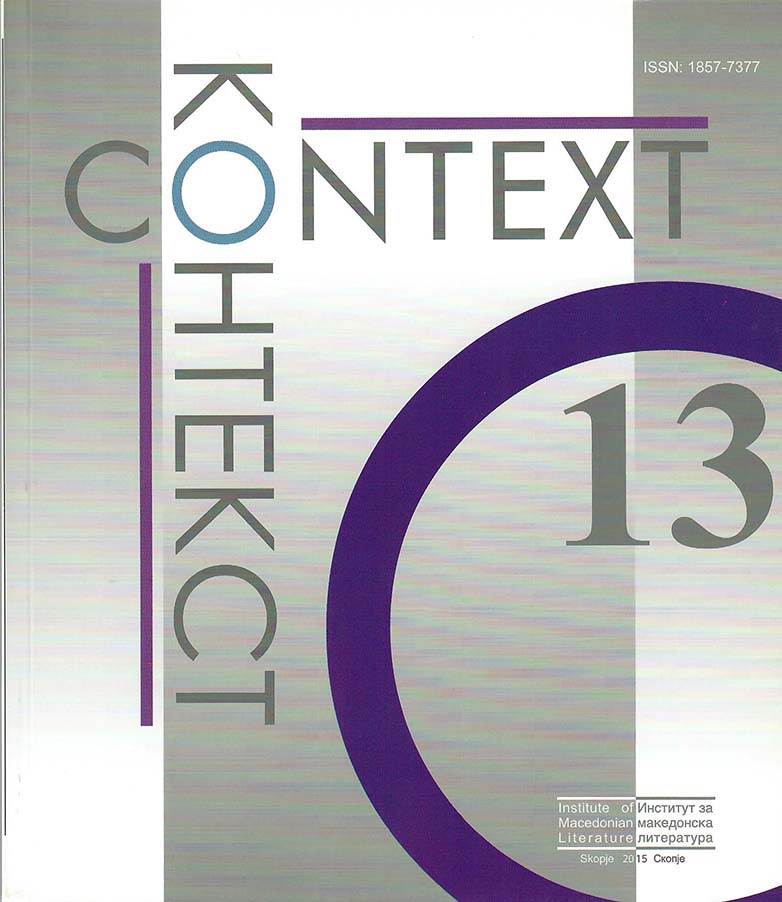АРБИТРАЖА НА РЕЛИГИСКИТЕ ВРЕДНОСТИ ВО СОВРЕМЕНОТО ОПШТЕСТВО
Arbitration of the Religious Values in the Contemporary Society
Author(s): Hristina IgnatovskaSubject(s): Christian Theology and Religion, Sociology of Religion, History of Religion
Published by: Институт за македонска литература
Keywords: religious values; secularisation; multicultural and multiethnic societies; social cohesion
Summary/Abstract: Regarding the arbitration of the religious values in the contemporary society, I start the exposé by their general diachronic reference. In fact, as such values in the scientific and practical sphere are encountered: syncretic, civilization, artistic, territorial, religious, ethnic, political, churches, civil, cultural, moral, social, linguistic, customary, traditional, legislative, funding, subsidized, tolerant, multicultural, anarchic, democratic, pluralistic, dialogical, intercultural, interreligious, intra national, harmonizing, cohesive, integrative, and inclusive. Summarizing, these are globalizing values as valuable subset absorb: freedom, law and non-discrimination. Social cohesion and integration of society, especially those with multicultural and multiethnic sign, also means achieving a high degree of stability and security in the state including the region too. The modern state is a specific political community of united citizens regardless of their ethnic, cultural, religious and other affiliations (Цветановска, 2007: 66-67). Nor insistence on the superiority or inferiority are the solution to the problem. Differences between the cultures are not the cause of conflict between them, and therefore the emphasis should be stated on similarities, rather than differences. (Петковска, in Цветановска, 2007: 66-67). The process of social integration is further burdened in multicultural and multiethnic societies, primarily because of the structure of the population and their belonging to different cultural and ethnic communities that still hold different values systems and different rules of social behavior. In this direction is the definition of social integration in multicultural environments, where it is a process through the various elements are combined in a certain unity while retaining their basic identity. The purpose of this complex process is to strengthen social cohesion and integration of members of specific groups in society facing it together with their identity. These two seemingly contradictory processes can be synthesized if there is a climate of tolerance and intercultural dialogue (Димитров in Цветановска, 2007: 69). In the contemporary societies secularization or de-traditionalism didn’t lead to the disappearance of religion. It continues to play an important public role and to cope with invasive domination of the state and its discussions. The process of differentiation of religion and the state does not lead to the exclusion of religion from the political scene, but to its diffusion. The process of secularisation, while underming the compose of the location and the significance of the sacral, it raises the prospect that different institutions and groups will base their demands for social prestige on different religious backgrounds. Secularization in the form of war has five reversible stages in the society to determine the boundaries of the sacral. The first step is the clergy, the second the war it started to determine the boundaries of the sacral, the third involves the state and its demands to share authority over the sacral and so builds the civil religion, the increased number of participants is the fourth step, and the separation of individual and collective sphere is the fifth step (Fenn, 1978: 26). Furthermore, within the contemporary social trends exists the so called quantifying the regulation of religious economies. This measuring is based on the following criteria: officially recognized church; official, state recognition of some churches, state determination or approval of the number of church leaders, government-paid church employees, system of collecting taxes and state subsidies (maintenance, costs, taxes, etc.) (Cshaves и Cann, 1992: 273). In order to determine the treatment of religions and in this respect the religious values as basic religious substances, Tasheva developed classification that includes aspects of civilization base, territoriality, political background, ethnicity, religious denomination or any combination. In order to detect the treatment of religion, despite the concessions, a number of approvals are discovered. The analysis considered the conclusions of the conditionality of the manifest forms of religion on the degree of the relationship of the church and the state, and the corresponding privileges for certain churches arising from this relationship. However, it is an indication that the constitutions contain only general values that uphold the law of a country, and the most general provisions on the regulation of things in them (Ташева, 2004: 132).
Journal: Context/Контекст
- Issue Year: 2015
- Issue No: 13
- Page Range: 23-37
- Page Count: 15
- Language: Macedonian

